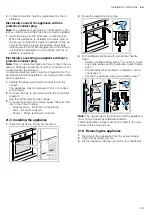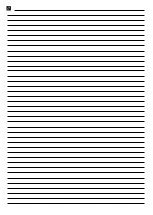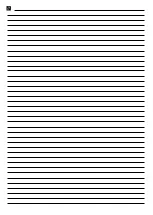
How it works
en
25
Food
Accessories/cookware
Shelf pos-
ition
Type of
heating
Temperature
in °C/grill
setting
Cooking
time in mins
Fillet of beef, medium, 1 kg
Wire rack
Universal pan
3
210-220
40-50
2
Pot-roasted beef, 1.5 kg
Cookware with lid
2
200-220
140-160
3
Sirloin, medium, 1.5 kg
Wire rack
Universal pan
3
200-220
60-70
2
Burger, 3–4 cm thick
Wire rack
4
3
25-30
4
Leg of lamb, boned, medium, 1.0 kg
Cookware without lid
2
170-190
70-80
5
Fish, grilled, whole, 300 g, e.g. trout
Wire rack
2
160-180
20-30
6
1
Preheat the appliance.
2
Turn the dish between halfway and two-thirds through the cooking time.
3
At the start, add liquid to the cookware so that at least 2/3 of the joint is covered in liquid
4
Turn the dish 2/3 of the way through the cooking time.
5
Do not turn the food. Cover the base with water.
6
Slide the universal pan underneath the wire rack.
20.5 Yoghurt
You can use your appliance to make your own yoghurt.
Preparing yoghurt
1.
Remove the accessories and shelf supports from
the cooking compartment.
2.
Pour the previously prepared yoghurt mixture into
small containers, e.g. into cups or small jars.
3.
Cover the containers with foil, e. g. with cling film.
4.
Place the containers on the cooking compartment
floor.
5.
Set the appliance according to the recommended
setting.
6.
After making the yoghurt, leave it to cool in the refri-
gerator.
Recommended settings for yoghurt
Food
Accessories/cookware Shelf position
Type of
heating
Temperature in
°C
Cooking
time in
mins
Yoghurt
Individual moulds
Cooking compartment
floor
1.
2.
1.
100
2.
-
1.
-
1
2.
8–9 hrs
1
Preheat the appliance.
20.6 Test dishes
These overviews have been produced for test institutes
to facilitate appliance testing in accordance with EN
60350-1.
Baking
Observe this information when baking test dishes.
General information
¡
The settings apply to food that is placed into a cold
cooking compartment.
¡
Observe the notes about preheating in the tables.
These setting values apply without rapid heating.
¡
When baking, use the lower of the listed temperat-
ures to begin with.
Shelf positions
Shelf positions for baking on two levels:
Note:
Items that are placed in the oven on baking trays
or in baking tins/dishes at the same time will not ne-
cessarily be ready at the same time.
¡
Universal pan: Level 3
Baking tray: Level 1
¡
Baking tins/dishes on the wire rack
First wire rack: Level 3
Second wire rack: Level 1
Shelf positions for baking on three levels:
¡
Baking tray: Level 5
Universal pan: Level 3
Baking tray: Level 1
Baking with two springform cake tins:








































